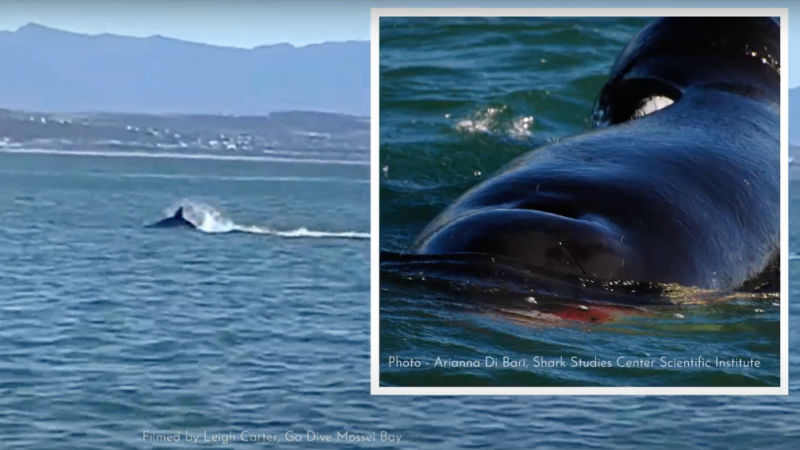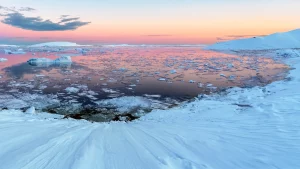Orca observed hunting and killing a great white shark by itself for the first time

When their kin aren’t attacking boats and porpoises or monitoring their large adult sons, some pods of orca whales are also known to attack the fearsome great white shark. Groups of these marine mammals are known to hunt and kill these giant fish in an epic battle of apex predators. Now, a solitary orca–aka killer whale–has been observed eating a great white shark for the first time. The findings are described in a study published March 1 in the African Journal of Marine Science.
“The astonishing predation, off the coast of Mossel Bay, South Africa, represents unprecedented behavior underscoring the exceptional proficiency of the killer whale,” Alison Towner, a study co-author and shark biologist from Rhodes University in South Africa, said in a statement.
Pack hunters–Willy vs. Jaws
Typically, orcas work together in groups to catch their prey–most often sea lions, seals, sharks and even other whales. When hunting together in a pod, they surround their prey and use combined strength and intelligence to attack. South Africa’s white sharks are predators in their own right and known for their stunning acrobatics and solo hunting.
[Related: Watch what can happen when killer whales tangle with great white sharks.]
In 2022, the same research team revealed that a pair of orca named Port and Starboard had been hunting and killing South Africa’s white sharks since 2017. Their predatory behavior has since driven large numbers of the sharks away from their natural aggregation sites. While orca whales can hunt large animals individually, this most recent occurrence is the first time that a single whale has been observed attacking a great white shark.
‘The scent of shark liver oil’
This incident was observed in June 2023 near Seal Island in Mossel Bay, about 248 miles east of Cape Town and is challenging conventional beliefs about the cooperative hunting behaviors in the region. Starboard the orca was working alone to “incapacitate and consume” an eight foot-long juvenile white shark in only two-minutes. Later, the orca was observed carrying the shark’s liver in its mouth.
“Upon reaching Mossel Bay’s Seal Island, the scent of shark liver oil and a noticeable slick indicated a recent kill. Tracking Port and Starboard near the island, they remained separated,” Esther Jacobs, from marine conservation initiative Keep Fin Alive, said in a statement recounting the day. “Witnessing a white shark’s fin break the surface initially sparked excitement, but that turned to a somber realization as Starboard swiftly approached. The moment Starboard rapidly preyed on my favorite shark species was both devastating and intensely powerful.”
What Jacobs and the others on the water that day were observing is a specialized feeding behavior. Orca in South Africa appear to have a strong preference for eating the lipid-rich livers of white sharks.
[Related: This could be the first newborn great white shark ever captured on camera.]
“Over two decades of annual visits to South Africa, I’ve observed the profound impact these killer whales have on the local white shark population,” added Primo Micarelli, from the Shark Studies Centre and Siena University in Italy. “Seeing Starboard carry a white shark’s liver past our vessel is unforgettable.”

At least two great white sharks were killed during these interactions, as a second carcass measuring 11.6 feet was also found nearby.
“This sighting revealed evidence of solitary hunting by at least one killer whale, challenging conventional cooperative hunting behaviors known in the region,” said Towner.
Shifting dynamics at sea
In addition to offering some new insight into predatory behavior in orcas, it’s also helping provide context to the ecosystem changes that may happen when orcas displace sharks as the apex predator. Understanding the dynamics at play as killer whales continue to prey on large sharks underscores the need for conservation strategies that can be adapted in a timely manner as the environment and ecosystem changes.
[Related: Great whites don’t hunt humans—they just have blind spots.]
“The observations reported here add more layers to the fascinating story of these two killer whales and their capabilities,” ecologist Simon Elwen said in a statement. “As smart, top predators, killer whales can rapidly learn new hunting techniques on their own or from others, so monitoring and understanding the behaviors used here and by other killer whales in South Africa is an important part of helping us understand more about these animals.”
Elwen is a whale ecology expert at the University of Stellenbosch and Founding Director and Principal Scientist at Sea Search Research & Conservation. He was not an author of this specific study.
These new findings and future studies should provide scientists in the region with more insight in how to adapt conservation measures. According to Towner, skilled “shark spotters” in Cape Town documented a record of over 300 great white shark sightings across eight beaches in 2011. Since 2019, there haven’t been any sightings in the area, as the sharks are moving further away from Cape Town. Threats from orcas like Port and Starboard and dwindling resources have prompted these great white sharks to begin to move further away.
“Despite my awe for these predators, I’m increasingly concerned about the coastal marine ecology balance,” said Micarelli.









